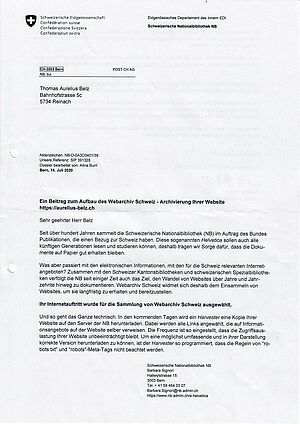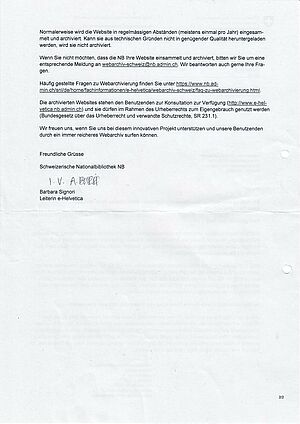B26 A first official appreciation?
From July 2020, the Swiss National Library will transfer this website to the Swiss web archive so that the content is also available to future generations.
As important as this step is, since a whole series of documents have been compiled which show significant cultural-historical connections, there is a discrepancy between the media, the educational directorates and the Pontificio Cosiglio della Cultura, since these institutions rejected the same content several times and both by reporting and publication, as well as inclusion in the curriculum. The reasons were quite different. From a result perspective, the interplay has been like censorship for a decade without being able to hold individual representatives of the different institutions accountable. Therefore, the term zeitgeist comes into play.
In order to make the matter a little transparent, the reasons for rejection are presented, insofar as they could be derived from the received feedbacks.
Resentment towards theological content, in particular, has been admitted to the author on several occasions, but the assumption is misleading that these might not be representatives of the Church. The discovery of the construction of the Catholic worldview on the basis of the Christian symbolism of the Western tonal system provides information about how a society that had little access to education outside of church influence was conveyed the creation of God and the resurrection as historical facts. Today one can only speak of manipulative influence and in view of the inquisition of abuse of power. For some representatives of the Church it is difficult to admit this frankly.
However, the hair-raising mathematical procedure for incorporating Christian symbolism into the formerly Greek sound system cannot be overlooked. However, it cannot be decided whether these were the specific reasons that led the Pontificio Consiglio della Cultura to reject several lectures and the Libreria Editrice Vaticana to withdraw the publication promise. Numerous questions with the request for reasons and some attempts at mediation by high-ranking church dignitaries remained without result - and this despite the advocacy of the emeritus Benedict XVI and the Pontificio Istituto di Musia Sacra.
It is not the case that the highest cultural authority of the Vatican would not admit its own cultural heritage, since the title of a musicological conference in the Vatican 2017 was: "Musica sacra, scala verso Dio", which refers to the Jacob's ladder, which was associated with diatonics - hence the term "sound-ladder" - before additional symbol references were added with the introduction of chromatics. A rejection of content can therefore only affect the analytical part, which makes the constructed reference to Holy Scripture clear and brings enlightenment thoughts into play.
Bias can also be found in the academic field - especially where great emphasis is placed on the strict separation of disciplines. This approach does not enable to come close to a comprehension of the so called catholic - i.e. all encompassing - world view. For this it is essential to look at cultural assets from the educational perspective of their time of origin. Taking up this task is of course not linked to a disdain for the current state of knowledge, but that alone does not help. Each discipline requires its own set of instruments - and especially dealing with symbolism also requires a particularly rational distinction. For example, the 1 and the 8 (prim and octave) stand for the alpha and omega in the musical-sacred area, in the neo-Nazi scene, however, for Adolf Hitler due to the assigned letters of the alphabet A and H. The meaning of a symbol depends on the respective context and the prevailing worldview. What comes along differently is simply not accepted - an alien discipline, an alien attitude, a young generation - the censorships second, third and fourth part.
In addition to this, historical research collides with the interests of the economy, which is about the marketability of products and not about cultural or ethical values that could never be quantified in any currency and therefore are not rewarded. Wherever an estimation shows that only a small group of people could be addressed, the publishers and the media wave-off in advance. The analysis of public attention - the ratings and clicks - shows best what could be described as a zeitgeist. The reasons mentioned are parts of it.
Of course, without knowledge of a new research result, interest in it cannot develop. Preliminary estimations may prove to be incorrect and more likely reflect the bias of the estimator. Very often it is just a question of how the content is conveyed to the audience.
All of this shows that interdisciplinary cultural-historical research is massively hindered - and there cannot even be a public debate about it, because the media do not go along, even though it is their job (information function, opinion-forming function, control function). The overused cliché of the ivory tower does not work here, and the terrain remains isolated until decision-makers become aware of it and act, as has just happened in a committee of the Swiss National Library.
However, a question about the reason led to the information that there is generally no evaluation of the content but the criterion for entry into the collection is only the reference to Switzerland. This reference exists in so far as the works of the Swiss music theorist Henricus Glareanus (* 1488 - † 1563) were on the index, who informs us that "his time" would recognize of the 14 keys only 8 (due to the reference to the 8 Blessings) and rarely 13 (the number of participants in the last supper).
Another point of reference is the Swiss pianist Franz Josef Hirt (*1899 - †1985), who with his 1955 illustrated book "Masterpieces of Piano Making" laid the foundation for a cultural-historical research into the inventory of instruments, the results of which can be found on this page www.aurelius-belz.ch in Switzerland.
Making the work results available to everyone free of charge does not violate applicable copyright law, but it would be an absolute no-go if it were material products. Decoupling from the bloodstream of economy and the term appreciation contradict each other. The given incentives encourage pejorative behavior. Money is made elsewhere.
Time-dependent priorities for thinking and judging - we spoke of the zeitgeist - have in common that they avoid self-critical reflection like the devil does holy water. Frank Urbaniok rightly warns of the fatal consequences of silence, the tendency to report and the distortion, which are pure poison for democracy. To reject the basics of music, to ignore its interdisciplinary connection and its interdenominational ethical content are mistakes that a civil society can only afford if it does not attach particular importance to its own future.
Appendix: Letter from the Swiss National Library to the author
Please click on the images to enlarge



